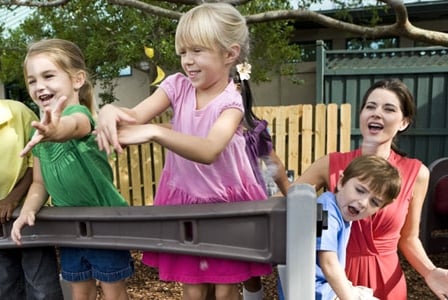
In a positive twist on peer pressure, a newly published study suggests that who our childrens friends are can significantly influence their physical activity levels.
The words peer pressure can have all kinds of negative connotations. But when it comes to getting your kids off the couch and out to play, it turns out peer pressure is a good thing. Who your kids spend time with may be the best motivator to getting them fit and active.
Study looks at friends
In a study by researchers at Vanderbilt University in Nashville, Tennessee, children between the ages of 5 and 12 were enrolled in two afterschool programs and followed for over 12 weeks. During this time, they were monitored by a device called an accelerometer to determine their level of activity. They were also asked about the friends they chose to spend time with.
Active friends = active kids
The researchers discovered that who they played with had a significant effect on the children’s activity levels. When kids played with others who had a higher level of activity, they were more likely to increase their own physical activity levels.
According to the study’s results, published in the journal Pediatrics, “Children consistently made adjustments to their activity levels of 10 percent or more to emulate the activity levels of their peers.”
Our kids fail at physical activity
This may be good news given the most recent Active Healthy Kids Canada report on physical activity released yesterday. In their report they gave Canadian kids an F for physical activity levels, with 93 percent failing to meet Canada’s guidelines of 60 minutes of physical activity a day.
Kids choose active play
The Active Healthy Kids Canada Report Card reports that 92 percent of Canadian children said they would choose playing with friends over watching TV. After school, given the choice, 74 percent would choose doing something active.
Given the Report Card’s sad statistic that 63 percent of free time after school and on weekends is currently spent being sedentary, placing more emphasis on developing a mentorship program that gets the active kids to lead the way at afterschool programs may be a step toward motivating even more kids to become active.
Play is all good
Getting our kids more active is not only good for their health, but it’s also been shown to improve their academic performance. It may be a tough choice the next time the neighbourhood kids come to lure your child away from his homework to play outside. But your child’s best friends may be those athletic kids—the ones with the good grades!



























